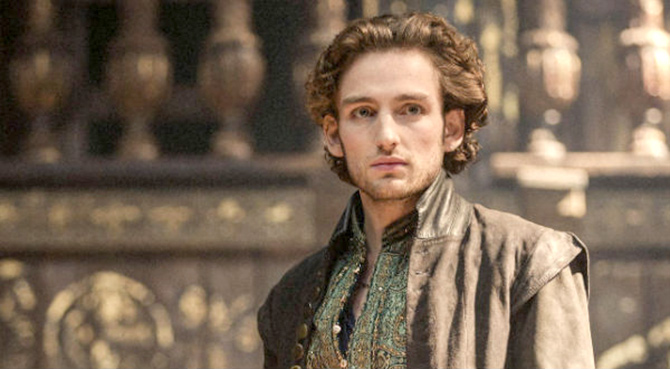‘His plays were like Bollywood cinema.’
IMAGE: Laurie Davidson as William Shakespeare in Shekhar Kapur’s Will.
Did you know that Shekhar Kapur made Will, a 10-part television series on William Shakespeare whose 456th birth anniversary fell on April 23?
“Will was about Shakespeare’s early life, about which very little is known,” Shekhar tells Subhash K Jha. “Historically, we know he was born in Stratford- upon-Avon in 1564, that he left his wife and children to be part of an emerging London theatre scene.”
“Then history finds him again when he started to become famous in theatrical circles at the Globe theatre in London. The Globe still exists, but the original building was burnt down.”
IMAGE: Laurie Davidson and Olivia DeJonge in Will.
For Will, Shekhar and his team recreated the Globe theatre to the last detail.
“We re-built the original Globe theatre from whatever maps we could find. We had 18 Oscar winners on our team. Television doesn’t have the same budget as a feature film, so I found the means to get the same scale into the medium.”
Will starred British theatre actor Laurie Davidson as Shakespeare.
“Laurie Davisdon is a reluctant star. I found him while he was still at drama school. He wanted to play Will, of course, but after that would avoid the media glare. As far as I know, he still does not have any social media interaction,” adds Shekhar. “He does a lot of theatre. He is a purist.”
A purist like Shekhar Kapur?
“I’m not too sure of that. I see film as part of the adventure of life, not a career. I dropped the word ‘career’ from my life when I was 24,” Shekhar explains.
“As a middle class Indian boy it was becoming too much of a burden. Since then I have been on an adventure where uncertainty is the main driving force.”
IMAGE: Laurie Davidson and Olivia DeJonge in Will.
Shakespeare, Shekhar says, was a playwright for the masses.
“Shakespeare was never the intellectual’s writer. He was a writer for the people of the streets. And what we laud as Shakespearean English today was then known as street slang. If he was to exist today, Shakespeare would have been a rapper. That’s how much of a populist he was.”
“His plays were like modern day Bollywood cinema… Song, dance, humour mixed in with some real in-depth understanding of human psychology. That was Shakespeare’s genius. His words and sonnets still resonate with modern audiences all over the world.”
The Shakespearean classics, Shekhar points out, “were written for rowdy, usually drunk, audiences of his time. They would burn the theatre down, beat up the players, have sex while the play was going on.”
IMAGE: Laurie Davidson in Will.
The production design in Will had an Indian touch.
“A lot in the show was borrowed from the lay-out of Dharavi to depict 16th century London. Everything I had seen on film or TV in the West of 16th century London showed people of the streets as drab. All done in grey tones,” says Shekhar.
“Artists and painters of that time were paid to paint people of wealth and of the court. I realised that the poorer you are, the greater you try and express your individuality through how you present yourself,” he adds.
“Watch the black population in Harlem, watch the streets of Soweto in South Africa. That’s why I went completely the other way in the costume design of Will.”
IMAGE: Ewen Bremner and Laurie Davidson, right, in Will.
To show ghetto aggression?
“Yes, that’s a good phrase. Ghetto aggression. I made the costume design very pop, as my own defiance and rebellion against the way the poor were always presented. Personally, I think Will Shakespeare was a product of what you just called Ghetto aggression,” the director says.
“And his words, his phrases, gave a depth of understanding that can only come from living amongst the poor and the downtrodden.”
“As we showed in the series,” adds Shekhar, “the plot for Romeo and Juliet was probably ‘stolen’ from an existing Italian novelette. Will re-wrote it and made it his own.”




